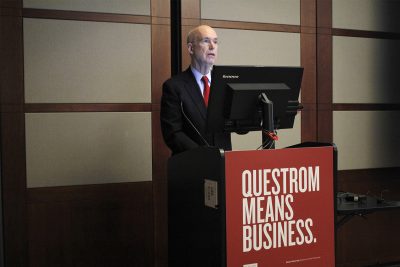
Five teams pitched their startup ideas in a quest to win the $15,000 grand prize and be recognized for their work.
The Boston University 2017 New Venture Competition was organized by BUzz Lab at the Questrom School of Business on April 4. The competition was judged by a panel of outside angel investors and sponsored by Microsoft as well as business law firm Morse Barnes-Brown and Pendleton.
“The best of the BU student startups are competing for over $10,000 tonight,” said Ian Mashiter, the director of BUzz Lab, to the crowd of attendees. “This is our annual prestigious competition judged by outside angel investors, and we’re excited to see the teams pitch.”
Hambleton Lord, who was a judge for the event and the managing director of Launchpad Venture Group, explained the diversity of ideas he often encounters at each of these events.
“Sometimes you see things that are interesting businesses that have a lot of potential, other times I’ll see businesses that are sort of like ‘me-too’ businesses you know, I’ve seen that kind of concept before, and it’s the same thing over and over again,” he said.
The five finalist teams, comprised of BU students and Boston-area professionals, brought a range of diverse ideas to the competition.
The competition opened with a presentation by Chef Box, a startup that aimed to provide energy meals in vending machines, so that people on the go could eat proper food in a small space of time. Christopher Beels and Ian Monzo, both MBA candidates at Questrom, presented their company pitch to the room of investors and won the third place award of $5,000.
This was followed by a presentation by George Kwon, a third-year student in BU’s Henry M. Goldman School of Dental Medicine, who talked about his startup, EarlierCare. EarlierCare is dedicated to helping people get dental appointments at an earlier date while simultaneously cutting down on the losses dentists face due to cancellations. He gave a highly energetic performance and won the first place award worth $15,000.
“I got a lot of advice from Ian along the way at each and every stage, and a lot of advice from BU advisors, and I can’t wait to provide this for the patients and doctors,” said Kwon, after winning the competition. “I’ll be using the $15,000 toward hiring marketing interns for the summer, as well as to leverage more employees and to really expand and grow our business.”
The third presentation, by Ashwin Melwani, was for EmployNet. He described the company as a LinkedIn for people who worked low-wage jobs. EmployNet was selected as the recipient of a special Microsoft award that gave the winning startup support from the tech giant.
The next presentation was by Questrom seniors Brian Zitin and Will Denslow. The duo spoke on on their startup, Sonder Partners. Sonder Partners works to bring “the ease of stock investment to the real estate world,” Denslow said. The commercial property trading company combines big data and machine learning, according to the company’s website.
“We’re essentially just taking all the data that’s otherwise not being used and we’re able to create indexes much like the stock market that just track the value of properties so that investors are now more informed,” Zitin said.
The team won both the audience choice award as well as the second place award.
The presentations closed with Unite Industries Inc. Co-founder Hiroshi Nasu and his team explained their concept behind Unite, a company that had built a web interface to help people get VIP access to nightclubs while earning more money for the nightclubs.
Howard Odom III, a sophomore in Questrom, talked about how glad he was to have attended the event.
“I’m an undergrad here at BU and I thought that it would be a good opportunity to come and see successful startups pitch their ideas and that could help me develop ideas of my own in the future,” Odom said. “It was very inspiring, so I’m glad I came.”
Using his background as an investor, Lord advised on the issue of students often having a narrow perspective and only focusing on problems relevant to them.
“I don’t know if you’ve noticed but sometimes when you go to these business plan competitions, what they’re doing is solv[ing] a problem that they have which is a really narrow audience,” he said. “I like to see problems that are bigger, that may try to solve issues for more people.”

















































































































